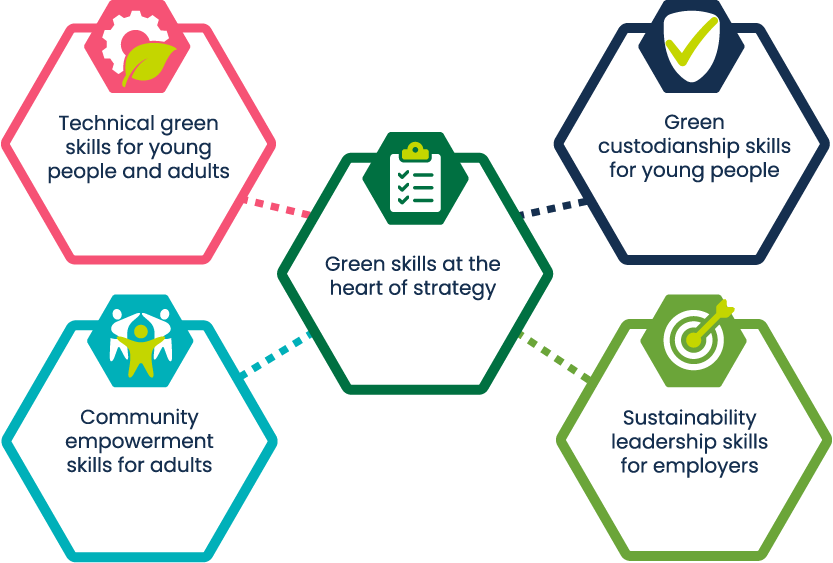What do we mean by green skills?
Understanding green skills: Defining and categorising for educational roadmaps

There is a lack of consensus on the definition of 'green skills', with various interpretations and competing views.
Drawing on the work of the European Centre for the Development of Vocational Training, the UK Parliamentary Office of Science and Technology offers the following definition:
Green skills can be defined as “the knowledge, abilities, values and attitudes needed to live in, develop and support a society which reduces the impact of human activity on the environment”. Green skills are often associated with sectors that will play a major role in reaching net zero greenhouse gas emissions by 2050, such as power, home heating, waste, and resources.
UK Parliamentary Office of Science and Technology
To facilitate the creation of a useable roadmap for colleges, this roadmap organises green skills into four categories. Within each category colleges can create learning and skills programmes and can secure funding for the related activity.
To deliver green skills successfully in each category, green skills need to be at the heart of college strategy.
Technical green skills for young people and adults
These encompass the practical and technical skills, often referred to as ‘hard skills,’ necessary for securing employment in green industries or for green roles within traditional industries. For instance, a position such as an electric vehicle maintenance technician represents a green job within a green industry, while a position such as a sustainability manager in the health service, is a green job in a non-green industry. Further education colleges can access funding through the adult education budget administered by the West Midlands Combined Authority, apprenticeship levy funding from employers, and government funding for young people aged 16-18 years, to provide training in technical skills, for green jobs.
Green custodianship skills for young people
Young people are the leaders and custodians of the region’s future sustainability, and investing in their skills and knowledge is essential. AIMHI EARTH have developed a framework of 15 essential green skills. These skills include critical thinking, scientific knowledge, cultural awareness, adaptability, entrepreneurial spirit, interpersonal skills, information literacy, and embracing diversity in thinking. The majority of the region’s young people, aged 16-18 years, in full time education, study in further education colleges. Through government funding for full time study programmes, colleges can help develop the custodianship skills of all young learners, no matter what they are studying on their core programme.
Community empowerment skills for adults
Green community empowerment skills are the skills that enable individuals and groups to engage effectively in sustainability initiatives within their own communities. For example, these skills might include an understanding of environmental issues, how to use green technologies, the ability to mobilise the community and to foster collaboration with local authorities, businesses, and other organisations. By empowering individuals with these skills, communities can work together to address the region’s environmental challenge at a local level. Further education colleges can design learning programmes focusing on these skills and access funding through the adult education budget, administered by the West Midlands Combined Authority, to enhance community empowerment skills.
Sustainability leadership skills for employers
These are the essential knowledge-based and practical skills necessary for leaders and managers, particularly in small and medium-sized enterprises (SMEs), to enhance the sustainability of their business operations. These skills could encompass various areas, such as adopting energy-efficient technologies, implementing changes in working practices, enhancing automation, and initiating productivity improvements. They might extend to understanding how to access funding to support sustainability enhancements, obtaining knowledge support, and achieving green accreditation to ensure compliance with procurement frameworks. Colleges have significant links with employers across the region and have access to funding from sources such as the Local Skills Improvement Fund (LSIF) and InnovateUK.





